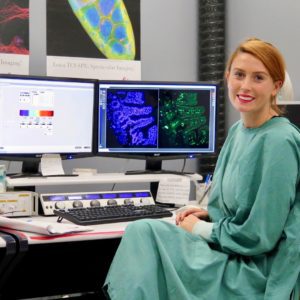Dr Hannah Wardill: Harnessing the power of the microbiome to prevent GvHD in children after a stem cell transplant

Blood cancer is the most diagnosed cancer for children aged 0-14 years in Australia.
Right now, 413 children aged between 0-14 are being diagnosed with a blood cancer annually, however this figure is set to more than double to 936 children each year by 2035.
Blood cancer in children is often treated with chemotherapy and transplantation of immune cells from a donor(stem cell transplant), however sometimes the new transplanted cells regard the recipient’s body as foreign. When this happens, the transplanted cells attack the recipient’s body, resulting in the debilitating and potentially deadly graft vs host disease (GvHD).
Dr Wardill, an NHMRC Early Career Fellow at SAHMRI, will focus on GvHD in paediatric patients who undergo stem cell transplant, testing new ways to minimise or prevent GvHD by altering the gut microbiome.
“While we know GvHD in children is different to adults, we rely on solutions developed in adults to manage its symptoms and we still cannot prevent it.”
Her vision – not only to improve the number of children surviving cancer but also ensure they go on to lead happy and fulfilled lives.
As a self-described “disrupter”, Hannah challenges convention, advocating for proactive and personalised supportive care to be better implemented into modern cancer medicine.
About Hannah
After completing her PhD at the University of Adelaide, Hannah relocated to the Netherlands to undergo paediatric supportive care training and has since returned to establish her research group at the South Australian Health and Medical Research Institute.
Hannah is motivated by collaboration and outreach, working closely with clinicians, scientists, and consumer advocates through her international leadership at the Multinational Association for Supportive Care in Cancer (MASCC). Her innovative approaches to cancer care and impact on the community have been broadly recognised, with Hannah awarded the MASCC Investigator the Year, South Australian 40under40 award for Social Impact and named a 2021 SuperStar of STEM.
This project is kindly supported through the Estates of Florence Brown and Carmelita Herzenak
Last updated on October 4th, 2022
Developed by the Leukaemia Foundation in consultation with people living with a blood cancer, Leukaemia Foundation support staff, haematology nursing staff and/or Australian clinical haematologists. This content is provided for information purposes only and we urge you to always seek advice from a registered health care professional for diagnosis, treatment and answers to your medical questions, including the suitability of a particular therapy, service, product or treatment in your circumstances. The Leukaemia Foundation shall not bear any liability for any person relying on the materials contained on this website.